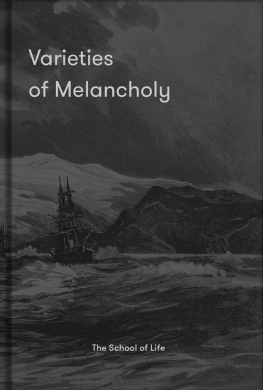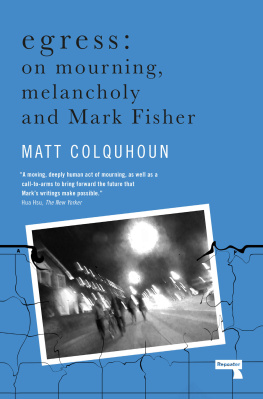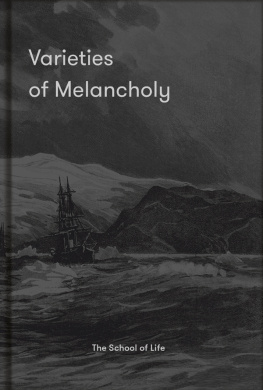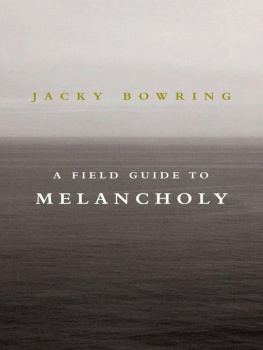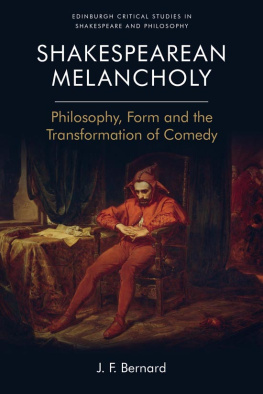ROBERT BURTON AND THE TRANSFORMATIVE POWERS OF MELANCHOLY
Literary and Scientific Cultures of Early Modernity
Series editors:
Mary Thomas Crane, Department of English, Boston College, USA
Henry S. Turner, Department of English, Rutgers University, USA
This series provides a forum for groundbreaking work on the relations between literary and scientific discourses in Europe, during a period when both fields were in a crucial moment of historical formation. We welcome proposals for books that address the many overlaps between modes of imaginative writing typical of the sixteenth and seventeenth centuries poetics, rhetoric, prose narrative, dramatic production, utopia and the vocabularies, conceptual models, and intellectual methods of newly emergent scientific fields such as medicine, astronomy, astrology, alchemy, psychology, mapping, mathematics, or natural history. In order to reflect the nature of intellectual inquiry during the period, the series is interdisciplinary in orientation and publishes monographs, edited collections, and selected critical editions of primary texts relevant to an understanding of the mutual implication of literary and scientific epistemologies.
Robert Burton and the Transformative Powers of Melancholy
STEPHANIE SHIRILAN
Syracuse University, USA

First published 2015 by Ashgate Publishing
Published 2016 by Routledge
2 Park Square, Milton Park, Abingdon, Oxon OX14 4RN
711 Third Avenue, New York, NY 10017, USA
Routledge is an imprint of the Taylor & Francis Group, an informa business
Copyright Stephanie Shirilan 2015
Stephanie Shirilan has asserted her right under the Copyright, Designs and Patents Act, 1988, to be identified as the author of this work.
All rights reserved. No part of this book may be reprinted or reproduced or utilised in any form or by any electronic, mechanical, or other means, now known or hereafter invented, including photocopying and recording, or in any information storage or retrieval system, without permission in writing from the publishers.
Notice:
Product or corporate names may be trademarks or registered trademarks, and are used only for identification and explanation without intent to infringe.
British Library Cataloguing in Publication Data
A catalogue record for this book is available from the British Library
The Library of Congress has cataloged the printed edition as follows:
Shirilan, Stephanie.
Robert Burton and the transformative powers of melancholy / by Stephanie Shirilan.
pages cm. (Literary and scientific cultures of early modernity)
Includes bibliographical references and index.
ISBN 978-1-4724-1701-5 (hardcover) ISBN 978-1-3156-0669-9 (ebook) ISBN 978-1-3170-6225-7 (epub)
1. Burton, Robert, 15771640Criticism and interpretation. 2. Burton, Robert, 15771640. Anatomy of melancholy. 3. Melancholy in literature. 4. Mind and body therapiesEnglandHistory17th century. 5. BibliotherapyEnglandHistory17th century. 6. Depression, Mental, in literature. 7. Melancholy. I. Title.
PR2224.S47 2015
828.309dc23
2015014046
ISBN: 9781472417015 (hbk)
ISBN: 9781315606699 (ebk-PDF)
ISBN: 9781317062257 (ebk-ePUB)
For Ryan, Alethea, Eden, and Lyra
In memory of Eduard Ben Tzion
(19472014)
Contents
List of Illustrations
Acknowledgments
Writing about the Anatomy of Melancholy reminds one that if all good books are centos any real appreciation of their efforts demands an account of their sources, not only of the ideas and arguments contained therein but the vital, if less visible, familiar spirits that animate them.
This book began as a dissertation written at Brandeis University under the direction of Mary Baine Campbell and Thomas King. A more perspicacious reader than Mary is not to be found. Whatever shines here is but a glimmer to her incandescence. Toms mark is to be felt throughout, but without his suggestion that I read the whole thing rather than simply parts of the Anatomy for my oral exams, the love of Burton that impelled this book would never have been born.
More people have played a part in the making of this book than I can mention, but a few in particular have loaned their expertise and support at critical junctures: Carla Mazzio, Elizabeth Harvey, Clare Preston, Julia Staykova, Leen Spruit, Koen Vermeir, Rebecca Olson, Vanita Neelakanta, and members of the Syracuse English Faculty Writing Group, especially Patty Roylance, Susan Edmunds, Carol Fadda-Conrey, Mike Goode, Kevin Morrison, Roger Hallas, and Chris Hanson. Wholly unknown to him, Reid Barbour responded to a query I sent him in graduate school with a generosity that I have since come to learn is his signature. This book is deeply indebted to his kindness and mentorship. The few and proud Burtonists and would-be Burtonists Ive met along my way share a resemblance with the man himself: generous, learned, and wickedly funny. I am especially grateful to Kathryn Murphy, Jonathan Sawday, Liliana Barczyk-Barakonska, and Ronald Corthell for sharing their work and thoughts.
Colleagues in the English Department and in Medieval and Renaissance Studies at Syracuse University have been strong allies since my arrival six years ago. I am most grateful to Erin Mackie and Dympna Callaghan for their mentorship, Crystal Bartolovitch for her invaluable professional advice and support, and to Susan Edmunds, Carol Fadda-Conrey, Claudia Klaver, Kevin Morrison, Patty Roylance, and Sanford Sternlicht for their good humor and generosity during times of calamity and celebration alike.
Shayna Skarfs friendship has sustained me over the years and daily proven the wisdom of Burtons words about the cure of good company. Susan Edmundss lessons in academic survival have had the happy theme (most germane to this book) of delightfully confusing trash and treasure. Carol Fadda-Conrey kept vigil through the long, cold nights of writing and revising. Andrew Griffin loaned his incomparable critical eye to each chapter and gave the book his blessing and his heart.
Students in undergraduate courses at Syracuse University, especially in two versions of my course titled Early Modern Melancholy, Madness and Meaning, helped me both to broaden and refine my thinking on the subjects of this book, as did audiences at meetings of the Renaissance Society of America, History of Science Society, and the Pacific Northwest Renaissance Society. I am also indebted to graduate students in my Introduction to Early Modern Studies and Early Modern Minds and Bodies seminars. Among these, I am particularly grateful to Melissa Welshans, Amy Burnette, and the late Joseph Hughes for their insights and enthusiasm.
Many libraries and librarians are to be thanked for facilitating this books writing and production. Syracuse University librarian Patrick Williams and staff in our Interlibrary Loan office routinely obtained materials in a pinch. Our preservationists staved off disaster when my office was visited by bookworms. Librarians at Christ Church, Brasenose, and Lincoln colleges, the Bodleian Library, English Faculty Library at Oxford, Wellcome Library, and the Osler Library for the History of Medicine were particularly generous with their time and assistance. Staff at the Bodleian Library, Houghton Library, University of Toronto Library, and Cornell University Library helped to obtain images and permissions for their reproduction here.
Erika Gaffney has been a champion of this project from the start. I am indebted to her and to the series editors, Henry S. Turner and Mary Thomas Crane, for taking a chance on a Burton book and for procuring such thoughtful and incisive reader reports. I pledge a debt of gratitude to my anonymous readers for their encouragement, challenges, and corrections. Joseph Kappes helped with the mammoth task of digitizing my bibliography. Mary Beth Hinton and Stephanie Peake greatly eased the pangs of delivering my first book with their patient and assiduous proofreading and copy-editing.
Next page

